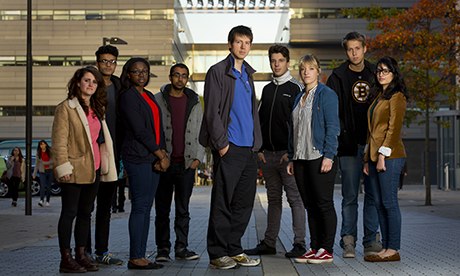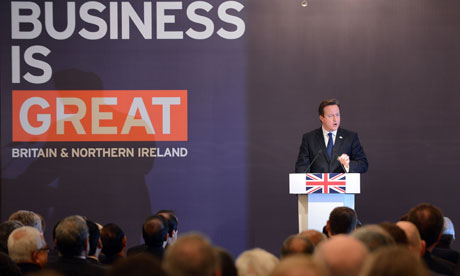'People will forgive you for being wrong, but they will never forgive you for being right - especially if events prove you right while proving them wrong.' Thomas Sowell
Search This Blog
Showing posts with label students. Show all posts
Showing posts with label students. Show all posts
Wednesday, 27 September 2023
Friday, 25 October 2013
Economics students aim to tear up free-market syllabus
Undergraduates at Manchester University propose overhaul of orthodox teachings to embrace alternative theories
- Phillip Inman, economics correspondent
- The Guardian,

The Post-Crash Economics Society at Manchester University. Photograph: Jon Super for the Guardian
Few mainstream economists predicted the global financial crash of 2008 and academics have been accused of acting as cheerleaders for the often labyrinthine financial models behind the crisis. Now a growing band of university students are plotting a quiet revolution against orthodox free-market teaching, arguing that alternative ways of thinking have been pushed to the margins.
Economics undergraduates at the University of Manchester have formed the Post-Crash Economics Society, which they hope will be copied by universities across the country. The organisers criticise university courses for doing little to explain why economists failed to warn about the global financial crisis and for having too heavy a focus on training students for City jobs.
A growing number of top economists, such as Ha-Joon Chang, who teaches economics at Cambridge University, are backing the students.
Next month the society plans to publish a manifesto proposing sweeping reforms to the University of Manchester's curriculum, with the hope that other institutions will follow suit.
Joe Earle, a spokesman for the Post-Crash Economics Society and a final-year undergraduate, said academic departments were "ignoring the crisis" and that, by neglecting global developments and critics of the free market such as Keynes and Marx, the study of economics was "in danger of losing its broader relevance".
Chang, who is a reader in the political economy of development at Cambridge, said he agreed with the society's premise. The teaching of economics was increasingly confined to arcane mathematical models, he said. "Students are not even prepared for the commercial world. Few [students] know what is going on in China and how it influences the global economic situation. Even worse, I've met American students who have never heard of Keynes."
In June a network of young economics students, thinkers and writers set up Rethinking Economics, a campaign group to challenge what they say is the predominant narrative in the subject.
Earle said students across Britain were being taught neoclassical economics "as if it was the only theory".
He said: "It is given such a dominant position in our modules that many students aren't even aware that there are other distinct theories out there that question the assumptions, methodologies and conclusions of the economics we are taught."
Multiple-choice and maths questions dominate the first two years of economics degrees, which Earle said meant most students stayed away from modules that required reading and essay-writing, such as history of economic thought. "They think they just don't have the skills required for those sorts of modules and they don't want to jeopardise their degree," he said. "As a consequence, economics students never develop the faculties necessary to critically question, evaluate and compare economic theories, and enter the working world with a false belief about what economics is and a knowledge base limited to neoclassical theory."
In the decade before the 2008 crash, many economists dismissed warnings that property and stock markets were overvalued. They argued that markets were correctly pricing shares, property and exotic derivatives in line with economic models of behaviour. It was only when the US sub-prime mortgage market unravelled that banks realised a collective failure to spot the bubble had wrecked their finances.
In his 2010 documentary Inside Job, Charles Ferguson highlighted how US academics had produced hundreds of reports in support of the types of high-risk trading and debt-fuelled consumption that triggered the crash.
Some leading economists have criticised university economics teaching, among them Paul Krugman, a Nobel prize winner and professor at Princeton university who has attacked the complacency of economics education in the US.
In an article for the New York Times in 2009, Krugman wrote: "As I see it, the economics profession went astray because economists, as a group, mistook beauty, clad in impressive-looking mathematics, for truth."
Adam Posen, head of the Washington-based thinktank the Peterson Institute, said universities ignore empirical evidence that contradicts mainstream theories in favour of "overly technical nonsense".
City economists attacked Joseph Stiglitz, the former World Bank chief economist, and Olivier Blanchard, the current International Monetary Fund chief economist, when they criticised western governments for cutting investment in the wake of the crash.
A Manchester University spokeman said that, as at other university courses around the world, economics teaching at Manchester "focuses on mainstream approaches, reflecting the current state of the discipline". He added: "It is also important for students' career prospects that they have an effective grounding in the core elements of the subject.
"Many students at Manchester study economics in an interdisciplinary context alongside other social sciences, especially philosophy, politics and sociology. Such students gain knowledge of different kinds of approaches to examining social phenomena … many modules taught by the department centre on the use of quantitative techniques. These could just as easily be deployed in mainstream or non-mainstream contexts."
Saturday, 6 April 2013
US universities offer software which they claim can instantly grade students' essays and short written answers
From The Independent 6/4/2013
Students could soon find their essays being instantly graded by a computer - rather than waiting weeks for a professor’s ponderous comments.
Students could soon find their essays being instantly graded by a computer - rather than waiting weeks for a professor’s ponderous comments.
New software developed in the United States which means they receive an instant grade through their computer if they send it online will be available for UK universities to use.
The software programme has been developed by EdX, a non-profit making enterprise set up by Harvard and Massachusetts Institute of Technology, and will be available free on the web to any organisation that wants to use it.
It uses artificial intelligence to grade students' essays and short written answers - freeing professors to carry out other work.
So far its use has been confined to the US - where a row is raging over whether it is right to use it to measure students’ essays which, in some subjects, include a fair amount of opinion around the factual content. Many academics believe it cannot replace the words of wisdom of a professional lecturer.
However, Anant Agarwal, president of EdX, predicted it would be a useful pedagogic tool - allowing students to redo essays over and over again thus improving the quality of their answers.
“There is huge value in learning with instant feedback,” he said. “Students are telling us they learn much better with instant feedback.”
He added: “We found that the quality of the grading is similar to the variation you find from instructor to instructor.”
An online petition against the practice, launched by a group calling itself Professionals Against Machine Scoring of Student Essays in High-Stakes Assessment, has amassed almost 2,000 signatures - including that of Noam Chomsky - protesting at the idea.
The group’s petition says: “Let’s face the realities of automatic essay scoring. Computers cannot ‘read’. They cannot measure the essentials of communication; accuracy, reasoning, adequacy of evidence, good sense, ethical stance, convincing argument, meaningful organisation, clarity and veracity, among others.”
On the other hand, students said that - if it was available for the individual to use - it could become a handy tool for a student to test the water on their essay before submitting to a professor for grading.
Tuesday, 19 February 2013
Cameron's immigration hierarchy: Rich Indians good, eastern Europeans bad
David Cameron's welcome mat to 'hardworking' Indians contrasts with attitudes towards the new EU entrants

David Cameron speaks at a business seminar in Mumbai on February 18. Photograph: Indranil Mukherjee/AFP/Getty Images
In The End of Tolerance,
Arun Kundnani argues that the ability to integrate in today's Britain
is based less on how you look and more on whether or not you are deemed
culturally compatible. This may seem like progress but the sliding scale
along which humanity is now organised is not unlike the racial
hierarchies of old; it's just less colour-coded. So, an English-educated
Indian professional may be more acceptable than a white, jobless
Bulgarian or Romanian. This is exactly on point as we witness David Cameron's rush to India, a country whose economic rise he described as "one of the great phenomena of the century".
Cameron and his entourage of CEOs and vice-chancellors will undoubtedly speed past the slums rapidly being cleared for the shiny new malls being built on every spare inch of India's major cities. The majority of Indians – arguably worse off since the advent of neoliberalism in the "largest democracy" – are not who Cameron has in mind when he talks about unleashing "India's potential".
Back in the UK, the imminent arrival of Bulgarians and Romanians with new EU rights is being painted as a make or break electoral issue. They are the victims of a "xeno-racism" that holds impoverished strangers, including whites, in its sight. In contrast, Indian students with the cash to pay premium fees to study at British universities will, according to Cameron, have the red carpet rolled out and will not, he has claimed, be subject to limits on how long they can stay and work. How such "positive discrimination" will be justified in light of the Tories' commitment to a cap on immigration in the tens of thousands per year remains to be seen.
Cultural stereotypes abound. Indians – not Pakistanis mind – are deemed hardworking and resourceful with infinite admiration for the UK and its traditions. Colonialism is rewritten as a "special relationship". Indians (Hindus) assimilate into the British way of life, speak English, and are religious moderates. They are not a drain, rather an opportunity for investment in an ailing British economy.
Romanians and Bulgarians, on the other hand, are today's "wretched of the earth", described by Trevor Kavanagh in The Sun as variably corrupt, as rapists and as pickpockets. The Tories will lose the Eastleigh byelection, he warns, unless the government puts its foot down and refuses to grant full EU rights to Romanian and Bulgarian citizens before they descend on the UK.
The comparison of Cameron's rhetoric on India and Britain's newest EU partners reveals how, on the surface at least, racism is so often influenced by economics. The successful are pitted against the scroungers, no matter the extent to which either stereotype holds water. Immigration with a capital "I" – as a headline rather than a life experience – has always needed heroes and villains, those who gave versus those who took, those who built versus those who destroyed. Racism works to attach these apparently natural attributes to whole groups of people and that is why it is never detachable from the immigration "debate". This is the message that Cameron is sending: we will tolerate those who can benefit us, but not those who fail to make us prosper.
Indians are no more universally assimilable than south-eastern Europeans are detrimental to the UK. Indeed, the opposite was once deemed to be the case when skin colour, rather than cultural compatibility, influenced migration policy more explicitly and arrivals from the east were dissidents, not purported social security hunters. Only when we decouple immigration from race will the arbitrariness of the ranking of populations according to profitability become apparent and racial generalisations – positive or negative – be shown up for the poverty of the ideas that lie beneath them.
Cameron and his entourage of CEOs and vice-chancellors will undoubtedly speed past the slums rapidly being cleared for the shiny new malls being built on every spare inch of India's major cities. The majority of Indians – arguably worse off since the advent of neoliberalism in the "largest democracy" – are not who Cameron has in mind when he talks about unleashing "India's potential".
Back in the UK, the imminent arrival of Bulgarians and Romanians with new EU rights is being painted as a make or break electoral issue. They are the victims of a "xeno-racism" that holds impoverished strangers, including whites, in its sight. In contrast, Indian students with the cash to pay premium fees to study at British universities will, according to Cameron, have the red carpet rolled out and will not, he has claimed, be subject to limits on how long they can stay and work. How such "positive discrimination" will be justified in light of the Tories' commitment to a cap on immigration in the tens of thousands per year remains to be seen.
Cultural stereotypes abound. Indians – not Pakistanis mind – are deemed hardworking and resourceful with infinite admiration for the UK and its traditions. Colonialism is rewritten as a "special relationship". Indians (Hindus) assimilate into the British way of life, speak English, and are religious moderates. They are not a drain, rather an opportunity for investment in an ailing British economy.
Romanians and Bulgarians, on the other hand, are today's "wretched of the earth", described by Trevor Kavanagh in The Sun as variably corrupt, as rapists and as pickpockets. The Tories will lose the Eastleigh byelection, he warns, unless the government puts its foot down and refuses to grant full EU rights to Romanian and Bulgarian citizens before they descend on the UK.
The comparison of Cameron's rhetoric on India and Britain's newest EU partners reveals how, on the surface at least, racism is so often influenced by economics. The successful are pitted against the scroungers, no matter the extent to which either stereotype holds water. Immigration with a capital "I" – as a headline rather than a life experience – has always needed heroes and villains, those who gave versus those who took, those who built versus those who destroyed. Racism works to attach these apparently natural attributes to whole groups of people and that is why it is never detachable from the immigration "debate". This is the message that Cameron is sending: we will tolerate those who can benefit us, but not those who fail to make us prosper.
Indians are no more universally assimilable than south-eastern Europeans are detrimental to the UK. Indeed, the opposite was once deemed to be the case when skin colour, rather than cultural compatibility, influenced migration policy more explicitly and arrivals from the east were dissidents, not purported social security hunters. Only when we decouple immigration from race will the arbitrariness of the ranking of populations according to profitability become apparent and racial generalisations – positive or negative – be shown up for the poverty of the ideas that lie beneath them.
Subscribe to:
Comments (Atom)
